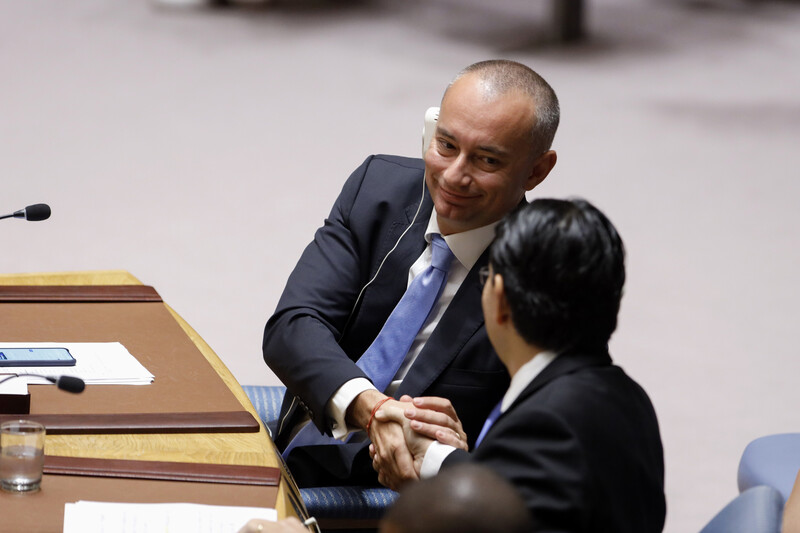Rights and Accountability 24 December 2020

Nickolay Mladenov shakes hands with Danny Danon, Israel’s representative at the United Nations, in September 2019.
XinhuaThe Bulgarian diplomat Nickolay Mladenov gave his final briefing to the UN Security Council as the secretary-general’s Middle East peace envoy this week.
Mladenov closed out his six-year tenure with a bleak update on the implementation of Security Council resolution 2334.
That resolution, adopted in 2016, reaffirms the illegality of Israeli settlements on occupied territory.
It also “stresses that the cessation of all Israeli settlement activities is essential for salvaging the two-state solution.” The resolution calls on states to distinguish between Israel and the territories it has occupied since 1967.
The Security Council receives a quarterly update on the implementation of the resolution.
Mladenov, fulfilling this mandate, did not have good news for the UN on Monday.
His final briefing was much like the 15 previous ones. He listed instances of Israeli settlement expansion and dutifully expressed regret and concern.
“Over the past year, Israeli authorities advanced controversial settlement plans that had been frozen for years,” he said.
“In the strategic location of E1, plans for some 3,500 units were advanced after an eight-year delay. If implemented, the E1 plan would sever the connection between the northern and southern West Bank.”
Mladenov stated that “the advancement of all settlement activity must cease immediately.”
But also like every briefing before it, his final update offered no specific call to action that would compel Israel to comply with international law.
While special envoy, Mladenov never once voiced his support for a war crimes investigation into Israel’s settlement enterprise at the International Criminal Court. Nor did he use his position to back the UN database of businesses operating in the settlements.
Instead of working towards accountability, Mladenov sought to privilege a hollow “peace” over justice and reward Israel for its violations of international law.
He did this by pushing “security coordination” between Israel and the Palestinian Authority and literally embraced Israeli leaders who make Palestinians’ lives a living hell.
Mladenov’s approach, ultimately, has been to view Palestinian rights as subject to negotiation with Israel, from which he has demanded nothing.
The diplomat has been credited with preventing another round of wholesale slaughter in Gaza like that in 2014.
But by rigidly adhering to the doctrine of a negotiated two-state solution, rather than demanding accountability, Mladenov and the UN secretary-general allow Israeli colonization of stolen Palestinian land to continue unhindered.
Mladenov has welcomed – if not advocated for, as he told an Israel lobby group – normalization agreements between Israel and Gulf monarchies such as the UAE. Yet these agreements are glorified arms deals that have nothing to do with peace or Palestinian self-determination.
In his final update to the Security Council, Mladenov drew false parity between Israeli colonizers and the dispossessed and stateless indigenous Palestinians subjected to its rule:
“Israelis and Palestinians, Jews and Arabs, have lived with conflict for too long. The painful reality of their struggle has affected every single family for generations,” Mladenov said.
“Loss and displacement is part of the personal history of every single household.”
Mladenov misconstrued a national liberation struggle as “a conflict over the very right of two nations to coexist.”
Norway’s role
Mladenov is to be replaced by Tor Wennesland, Norway’s Middle East envoy.
What might proponents of justice and Palestinian rights expect from Mladenov’s successor?
Norway is the permanent chair of the Ad Hoc Liaison Committee that coordinates among international aid donors to the Palestinian Authority, including the EU, UN and the United States.
That committee is a product of the Oslo accords negotiations held between Israel and the Palestine Liberation Organization in the 1990s, facilitated by Norway, which only served the stronger party.
“The two parties were not equal in any sense of the word and were not treated as equals by the Norwegians,” a study by scholar Hilde Henriksen Waage for the Peace Research Institute of Oslo concluded.
The late Palestinian scholar Edward Said, who resigned from the PLO’s executive committee in protest of the process, described the Oslo accords as “an instrument of Palestinian surrender.”
The Oslo negotiations were fundamentally asymmetrical and imposed a false parity between occupier and occupied, colonizer and colonized.
It is a fundamentally dishonest and flawed paradigm that has served as the UN’s political framework in Palestine.
Norway effectively acted as Israel’s agent during the Oslo process, demanding Palestinian concessions while treating Israel’s red lines as sacred. It came out of that process with a high-profile appointment to permanently chair the Ad Hoc Liaison Committee.
“With marginal influence over donors,” Norway was seen as the compromise candidate by the US and EU, which both wanted the position for themselves.
But as Waage observes, Norway in its capacity as committee chair has served as a proxy for the Americans: “The United States ran the business, and Norway was its partner and messenger.”
The grotesqueries of the Oslo process are reflected in the committee’s current practices.
The Ad Hoc Liaison Committee has included at its donor conferences high-ranking representatives of the Israeli military who are responsible for creating the dire conditions necessitating international aid to the Palestinians.
They’ve treated war criminals as stakeholders in determining what aid Palestinians get and how they get it.
While positioning itself as the broker of aid to Palestinians, Norway supplies arms to Israel and treats the jailers of Gaza as partners with which it looks forward to cooperating.The Nordic state opposes the boycott, divestment and sanctions movement in support of Palestinian rights. Its current government has sought to grow closer to Israel.
There is little reason to believe that Mladenov’s successor will depart from the practice of demanding nothing of Israel while expecting everything from the Palestinians.
There may be differences in style and experience from one UN special envoy to the next. But at the end of the day, these diplomats are appointed to implement a framework that inherently favors Israel at the expense of Palestinians’ most basic rights.





